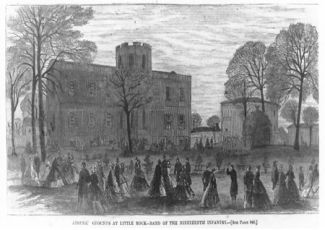 Arkansas, 25 years old as a state, is on the frontier of the American South. Fort Smith, existent thanks to the U.S. military, represents both the frontier status of the state and the high degree of dependence that Arkansas has upon the federal government.
Arkansas, 25 years old as a state, is on the frontier of the American South. Fort Smith, existent thanks to the U.S. military, represents both the frontier status of the state and the high degree of dependence that Arkansas has upon the federal government.
To the west, especially in the Ozarks, dwell white families who largely migrated from neighboring upper South states. Food crops and livestock are common in this part of Arkansas. Slavery is not common compared to much of the Deep South, and white citizens are less concerned with President Abraham Lincoln’s policies than are many other white southerners.
Down south in the Delta, meanwhile, many white Arkansans hail from the Deep South states of Mississippi, Louisiana and Arkansas. Slavery is common, thanks to the preponderance of cotton.
Baptists have been present in Arkansas for almost four decades, with the Arkansas Baptist Convention having been organized in 1848. Like other Arkansans, Baptists in the months prior to the war were divided between Union and Confederate loyalties.
Union sentiment in the state until recently had called into question whether Arkansas might split apart over the issue of war and slavery. Yet the Confederate seizure of Fort Sumter mere weeks ago turned many Unionists into secessionists, and today state convention delegates vote overwhelmingly to become the ninth southern state to join the Confederacy.
Arkansas’ story, similar to that of Virgina, reflects the importance that Fort Sumter played in the consolidation of additional southern states into the Confederacy. When the North fired upon the South at Sumter – even though the South fired first – many southern Unionists felt compelled to support the South out of regional loyalty.
Source: A brief analysis of Arkansas in 1861 (link); illustration of Little Rock in 1861 (link)


